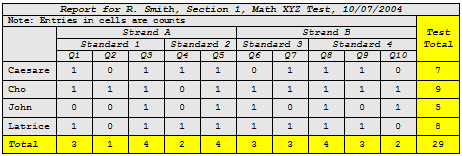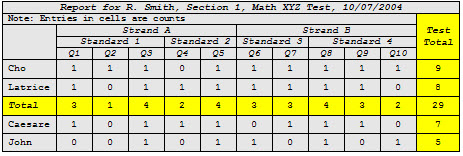The Value of Mistakes in the Creative Process
 Aug 29, 2010 at 2:31 AM
Aug 29, 2010 at 2:31 AM This is not a treatise on the general topic of the title. That would be pretentious. No, it is just a recounting of how one very specific mistake came to produce something of value. Still, it is instructive. Some time and a number of versions ago, we decided to add a sorting capability to one of our Reports Online Software (ROS) online reports. The report to be sorted originally looked something like the following:

The intent was to allow the class to be sorted in the order of total test scores. This was so that the reader of the report could easily see who was doing well and who was not. (Note that the report can be sorted on any column, so that students can be ordered by scores on a given strand, a standard, or even cognitive level. This is a very flexible report.) The programmer put in the row sorting routine and ran it. This produced the following report:

Oh, my gosh, that’s strange . . . long pause . . . Oh, of course, I sorted all the rows in the table by accident. I should have stopped with the last student row.
I can fix that . . . another long pause . . . Do I want to? Maybe it’s good. He asked the rest of us what we thought. We all said, leave it that way!
Thus was born a new feature in ROS, originally fathered by a mistake. You see, the students above the Totals Row performed above average for the class and the students below the Totals Row performed below average. There is no “Lake Woebegone Effect” here. Half of the students, unfortunately, are below average. That’s just the way the math always works. [Not strictly true, as the average is the mean, not the median.]
So, what is the moral of this tale? I think it’s that you should recognize a good thing when you see it.
“Chance favors the prepared mind.” (Dans les champs de l’observation le hasard ne favorise que les esprits préparés.) (Louis Pasteur, 1854)
David Mott
|
Report for R. Smith, Section 1, Math XYZ Test, 10/07/2004 |
|||||||||||
|
Note: Entries in cells are counts |
Total |
||||||||||
|
|
Strand A |
Strand B |
|
||||||||
|
Standard 1 |
Standard 2 |
Standard 3 |
Standard 4 |
||||||||
|
Q1 |
Q2 |
Q3 |
Q4 |
Q5 |
Q6 |
Q7 |
Q8 |
Q9 |
Q10 |
||
|
John |
1 |
0 |
1 |
1 |
1 |
0 |
1 |
1 |
1 |
0 |
7 |
|
Latrice |
1 |
1 |
1 |
0 |
1 |
1 |
1 |
1 |
1 |
1 |
9 |
|
Cho |
0 |
0 |
1 |
0 |
1 |
1 |
0 |
1 |
0 |
1 |
5 |
|
Caesare |
1 |
0 |
1 |
1 |
1 |
1 |
1 |
1 |
1 |
0 |
8 |
|
Total |
3 |
1 |
4 |
2 |
4 |
3 |
3 |
4 |
3 |
2 |
7.25 |

